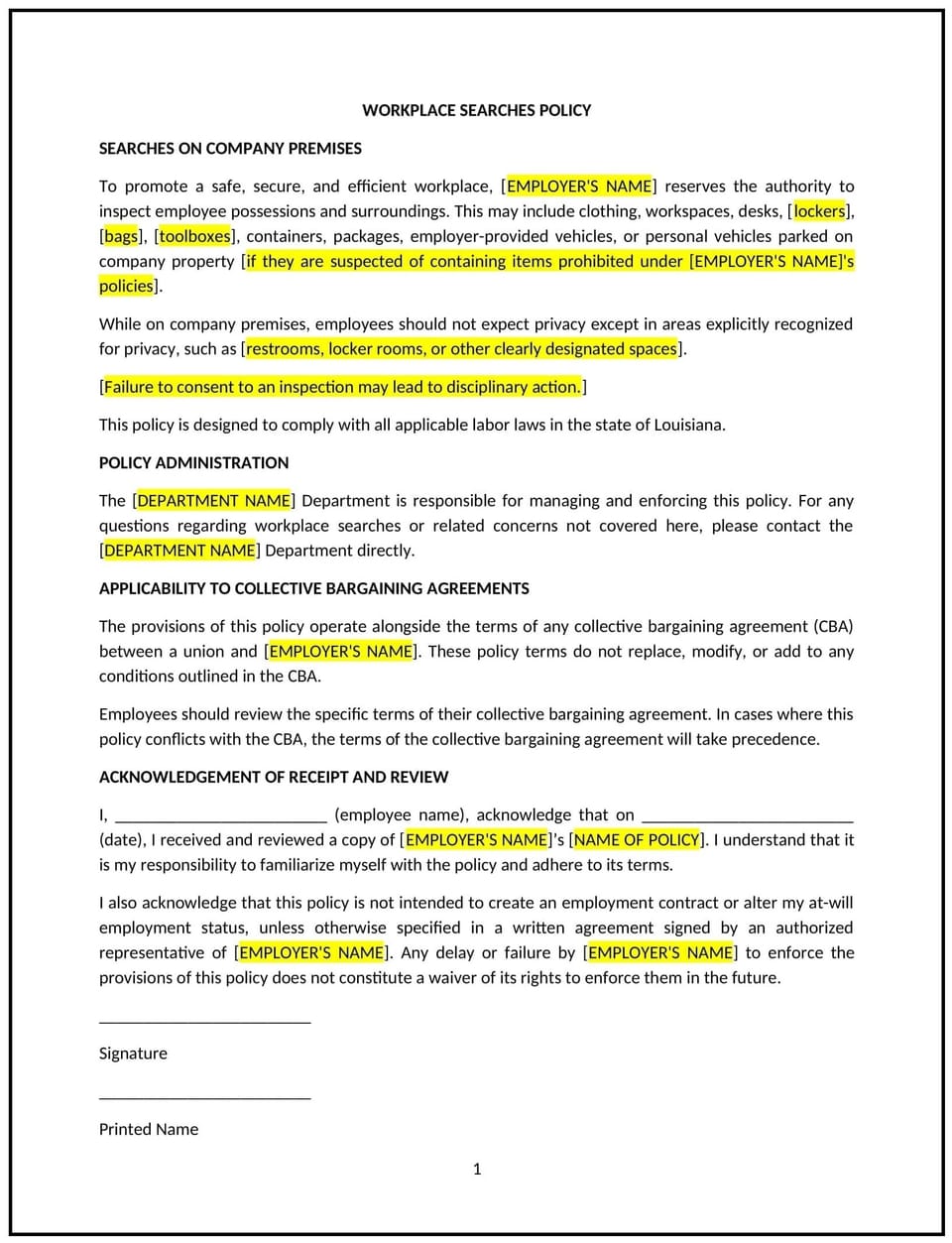Workplace searches policy (Louisiana): Free template

Workplace searches policy (Louisiana)
This workplace searches policy is designed to help Louisiana businesses establish clear guidelines for conducting searches of employee belongings, workspaces, and company property to maintain a safe and secure work environment. It outlines the procedures, purposes, and employee rights regarding workplace searches.
By implementing this policy, businesses can protect company assets, ensure workplace safety, and establish transparent protocols for handling searches.
How to use this workplace searches policy (Louisiana)
- Define the scope of searches: Specify the areas subject to search, such as personal items (bags, lockers), workspaces (desks, computers), and company property (vehicles, equipment).
- Communicate the purpose: Clearly state the reasons for conducting searches, such as ensuring workplace safety, preventing theft, or maintaining company policies.
- Outline consent and notice requirements: Specify when and how employees will be notified about the possibility of a search and obtain consent when appropriate.
- Address privacy considerations: Clarify the company’s commitment to balancing security with respect for employee privacy and confidentiality.
- Include procedures for conducting searches: Detail the process for carrying out searches, including who can perform them, when they will occur, and how they will be documented.
- Provide consequences for non-compliance: Specify the actions that may result from refusing a search or attempting to circumvent the process.
Benefits of using a workplace searches policy (Louisiana)
Implementing this policy provides several advantages for Louisiana businesses:
- Protects company assets: Safeguards valuable resources by preventing theft, fraud, or the possession of contraband.
- Promotes safety: Helps maintain a secure work environment by deterring dangerous items, substances, or behaviors.
- Ensures transparency: Establishes clear expectations and procedures for conducting searches, reducing misunderstandings or conflicts.
- Supports legal protection: Provides a structured and legally defensible approach to conducting searches when necessary.
- Reflects Louisiana-specific considerations: Adapts to local legal requirements and workplace safety standards.
Tips for using this workplace searches policy (Louisiana)
- Communicate clearly: Ensure all employees are aware of the policy and understand the circumstances under which searches may occur.
- Train management: Provide training to supervisors and HR staff on how to carry out searches respectfully and in compliance with the policy.
- Be consistent: Apply the policy consistently to all employees, ensuring fairness and transparency in search procedures.
- Respect privacy: Balance workplace security needs with respect for employee privacy rights.
- Update regularly: Revise the policy to reflect changes in workplace security needs, employee privacy laws, or Louisiana-specific regulations.
Q: What areas of the workplace are subject to searches?
A: The policy applies to personal items (such as bags or lockers), workspaces (such as desks or computers), and company property (such as vehicles or equipment).
Q: Why might a search be conducted?
A: Searches may be conducted to ensure workplace safety, protect company assets, prevent theft or fraud, or enforce company policies regarding prohibited items.
Q: Will employees be notified before a search?
A: Employees should be notified in advance about the potential for searches, and, where applicable, consent will be obtained before conducting the search.
Q: Can employees refuse a search?
A: Employees may be asked to consent to a search; refusal may result in disciplinary action depending on the circumstances, as outlined in the policy.
Q: Who is authorized to conduct a search?
A: Searches should be conducted by designated personnel, such as HR representatives, security staff, or supervisors, in accordance with company procedures.
Q: How often should this policy be reviewed?
A: The policy should be reviewed annually or when changes occur in workplace security needs, employee privacy laws, or Louisiana-specific regulations.
This article contains general legal information and does not contain legal advice. Cobrief is not a law firm or a substitute for an attorney or law firm. The law is complex and changes often. For legal advice, please ask a lawyer.


